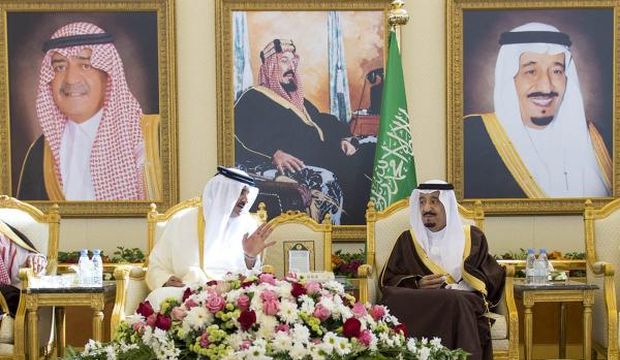Over the course of three days the Custodian of the Two Holy Mosques, Saudi Arabia’s King Salman Bin Abdulaziz, has been receiving Gulf leaders in the Saudi capital Riyadh: the Emir of Kuwait, Sheikh Sabah Al-Ahmed Al-Jabir Al-Sabah; then the Crown Prince of Abu Dhabi, Sheikh Mohammed Bin Zayed Al Nahyan; and finally the Emir of Qatar, Sheikh Tamim Bin Hamad Bin Khalifa Al Thani.
Since King Salman took over the reins in Saudi Arabia he has wasted no effort in fulfilling his leadership duties, both related to domestic and foreign affairs. And of course it is natural that his attention would first focus on the domestic file before turning toward the Gulf.
A sort of protective wall or barrier surrounds the Gulf states, from which their people look out in comfort in their security and safety, while the rest of the Arab world anxiously looks in, overwrought by the calamities they are facing.
There are dangers that concern and threaten the Gulf states. In coordinating their efforts and unifying their visions and policies, these countries gain strength and protection against these dangers. When their efforts are divided, however, and viewpoints and policies collide, they are weakened.
The developing situation in Yemen is certainly one of these dangers, as it affects everyone in the region. Yes, of course countries will have differing viewpoints on a number of issues; this is completely acceptable and expected. But as one concerned individual once told me: “We are not so deluded to think there will be agreement across the board on this or that matter. But there are times when entertaining differing viewpoints becomes a luxury one cannot afford, because doing so, along with what results from it in the the political sphere, will harm everyone: the side holding the view, and the side holding the opposing one.”
In recent days Egypt has entered the fray and begun its own fight against terror groups, sending its warplanes to Libya to bomb Islamic State of Iraq and Syria (ISIS) targets in the country. Meanwhile, the Gulf states are standing shoulder-to-shoulder in support of Egypt here, and President Abdel-Fattah El-Sisi has now called for the formation of an international anti-ISIS coalition in Libya, along similar lines to the one fighting ISIS in Syria, where Saudi Arabia forms the alliance’s main Arab spine.
The involvement of Saudi Arabia and the UAE are essential components of any fight against terror groups in the region, and it was based on their efforts that the fight took shape in the first place. Here the words of Sheikh Mohammed Bin Zayed of the UAE are pertinent. Speaking following his recent meeting with King Salman, he characterized the relationship between both countries as “special,” calling Saudi Arabia “the main bedrock of stability and security in the region” and adding that with King Salman at the helm both countries would be “in safe hands,” according to the Emirates News Agency.
Saudi Arabia’s ambassador to the UAE recently told this newspaper that both countries’ policies have been in harmony for a number of years now, with the latest incarnation of this being their joint positions and involvement in the fight against ISIS in the region, “which wants to abduct the religion of Islam.”
Coinciding with all this recent diplomatic activity in Riyadh was another voice from the Gulf, that of Bahrain’s Crown Prince, Sheikh Salman Bin Hamad Bin Isa Al Khalifa, who wrote on the global fight against terrorism in Britain’s Daily Telegraph newspaper recently, maintaining that “these individuals and groups will of course ebb and flow, but it is the ideology that must be combated and defeated.”
Yes, the Gulf is fighting the ideology that produces extremism, and not just extremist groups. Anyone who cannot see this needs to have their vision examined.
